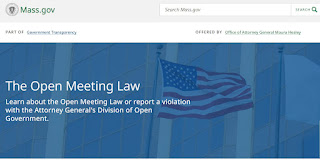From the MA Attorney General's Office on Open Meeting Law Guidance:
Guidance Spotlight: Subcommittees and Sub-quorum Communications
This month we offer guidance on the creation of subcommittees under the Open Meeting Law, and permissible communications among members that constitute less than a quorum of a public body. We recognize that public body members want to conduct business efficiently and effectively. However, public body members must exercise caution when communicating and carrying out the public body’s responsibilities outside of a properly posted meeting. The Open Meeting Law prohibits deliberation outside of a posted meeting. “Deliberation” is communication among a quorum on a matter within the public body’s jurisdiction. Because the Open Meeting Law focuses on communications among a quorum, there is no prohibition on communications outside of a meeting that do not involve or reach a quorum of members—as long as the members are not also a quorum of a subcommittee. Therefore, it is important to understand whether members of a public body may constitute a designated subcommittee.
The Open Meeting Law defines “public body” as any “multiple-member board, commission, committee or subcommittee within the executive or legislative branch or within any county, district, city, region or town, however created, elected, appointed or otherwise constituted, established to serve a public purpose.” G.L. c. 30A, § 18. The Law further defines a “subcommittee” as “any multiple-member body created to advise or make recommendations to a public body.” Id. A public body forms a subcommittee when the body formally authorizes multiple members of the public body to advise or make recommendations to the public body. Whether a subcommittee was created hinges on the public body’s action and whether it intended to create a multiple-member body, or whether it intended to assign the task to one person, even if another member of the public body subsequently volunteers to assist. Therefore, if a single member undertakes a task, or multiple members decide on their own to communicate about a matter or prepare a recommendation without having been designated to do so, no subcommittee is created. Furthermore, the name of a group—whether called a subcommittee, a “working group,” a “task force” or something else—will still be subject to the Open Meeting Law if it is a multiple-member body created to advise or make recommendations. Even subcommittees that have members who are not part of the public body will be subject to the Open Meeting Law if they meet the Open Meeting Law’s definition of “public body.”
Subcommittees are public bodies in their own right, which means they must follow all of the Open Meeting Law’s requirements applicable to public bodies. Subcommittee members should be particularly careful about any communications they have with their fellow subcommittee members in order to avoid deliberating outside of a posted meeting, as the subcommittee has its own (smaller) quorum. The quorum of a public body, including a subcommittee, is a simple majority of its members, unless otherwise provide by law. Therefore, although it is generally permissible for public body members to communicate amongst themselves outside of a posted meeting as long as the communications do not involve or reach a quorum (whether concurrently or serially), public body members must always be cognizant of the makeup and quorum of the public body, including any subcommittees on which they serve.
Determinations Regarding Subcommittees and Sub-quorum Communications:
OML 2021-176: Finding no violation of the Open Meeting Law because text message conversations did not contain or reach a quorum of the Board. In all cases, the Board members engaged in one-on-one text exchanges during the meeting. In addition, we find no evidence of serial deliberation among a quorum of the Board.
OML 2021-115: Subcommittee deliberated outside of a posted meeting, in violation of the Open Meeting Law, when a quorum of the Subcommittee discussed the status of a matter that was clearly within the Subcommittee's jurisdiction outside of a posted meeting.
OML 2018-128: Board did not create a subcommittee where the Board took no vote after one member offered to research a topic and another member of the public body subsequently volunteered to assist.
OML 2017-111: Board did not create a subcommittee where the Board clearly intended to assign a task to one person and another member of the public body subsequently volunteered to assist.
OML 2016-96: Working Group did not create a subcommittee where two members of the Working Group, on their own initiative, worked on projects for the benefit of the Working Group, without the Working Group taking any official action to delegate that responsibility to the two members.
For more info on Open Meeting Law visit -> https://www.mass.gov/the-open-meeting-law
 |
| Open Meeting Law Guidance Spotlight: Subcommittees and Sub-quorum Communications |